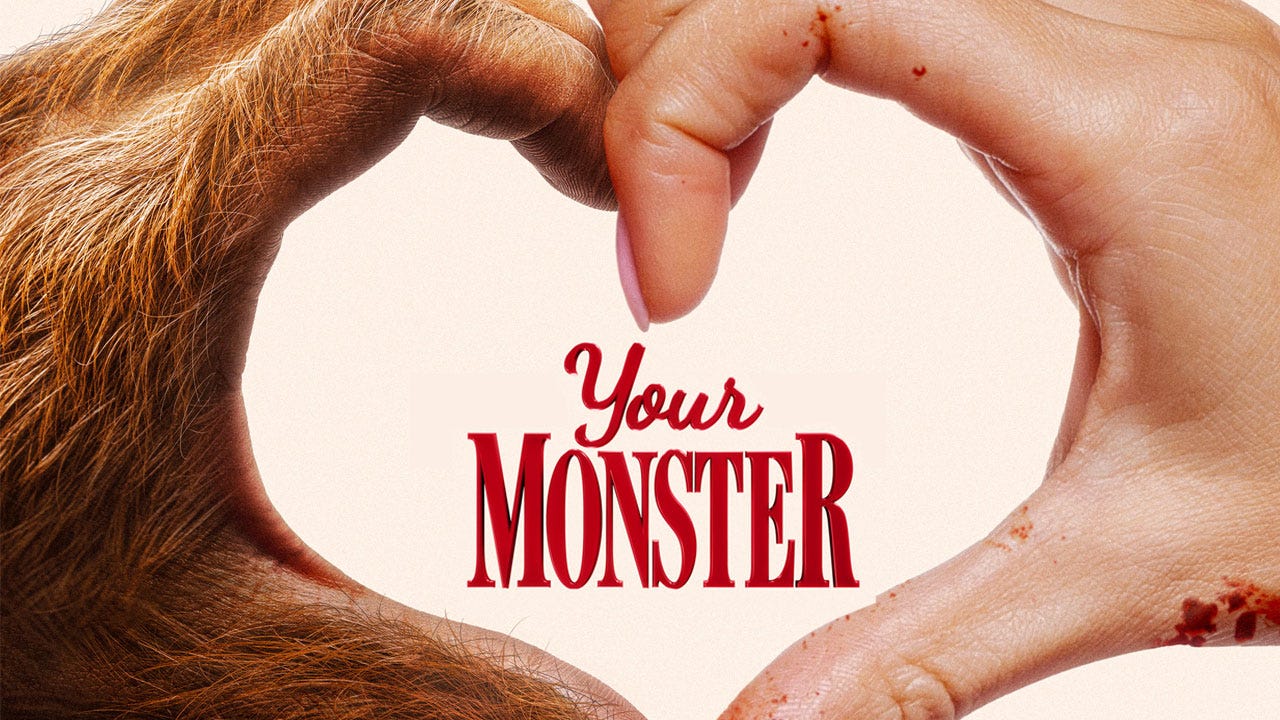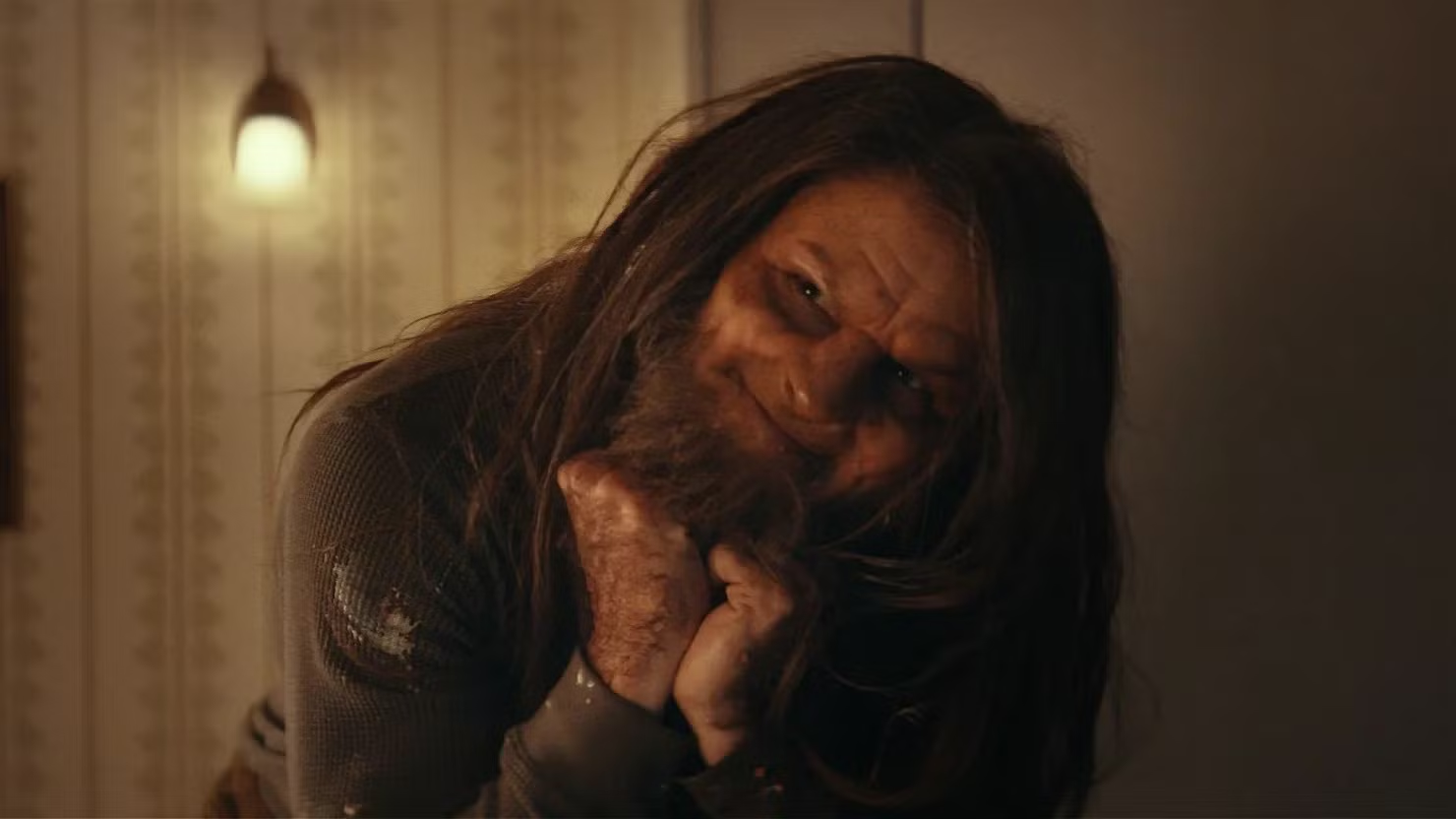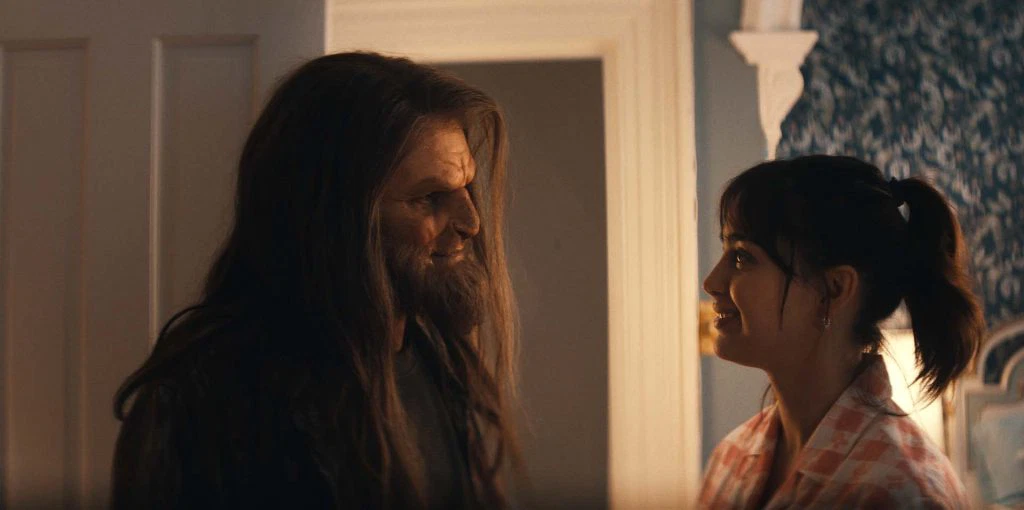Your Monster is a beautiful blend of horror, romance, and dark comedy that explores self-worth, anger, and personal growth. Directed by Caroline Lindy, the film follows Laura (Melissa Barrera), a struggling actor recovering from cancer treatment. As she faces emotional and physical challenges, including being dumped by her boyfriend Jacob (Edmund Donovan), Laura finds solace in the reappearance of her childhood “Monster” (Tommy Dewey). What begins as a reunion turns into an unexpected romance, complicating Laura’s already tumultuous life.
While the romantic aspect of the story is prominent, Your Monster delves deeper into themes of self-empowerment and personal discovery. At its heart, the film is about Laura reclaiming her sense of self-worth. This journey is shaped by her relationship with the Monster, who seems to act as both a literal and metaphorical figure in Laura’s life. The question of whether the Monster is real or just a manifestation of Laura’s psyche adds complexity to the narrative, leaving its true nature open to interpretation. With the ambiguous ending, the film challenges viewers to reflect on the deeper meaning behind Jacob’s death and Laura’s personal transformation.
Your Monster Ending Explained

In Your Monster, Laura’s relationship with the Monster evolves over time, shifting from uncertainty and tension to emotional connection and growth. At the start, it’s unclear whether the Monster is a physical presence or simply a reflection of Laura’s inner rage and frustration. Initially, the Monster serves as an emotional support, helping Laura navigate the challenges of life after cancer and her painful breakup. Although their bond begins on rocky ground, the Monster soon becomes a significant part of Laura’s journey toward healing.
However, the relationship becomes strained when Laura impulsively kisses her ex-boyfriend Jacob, leading to a confrontation with the Monster. The Monster’s anger stems not only from Laura’s actions but also from her inability to let go of the toxic relationship with Jacob. Frustrated by Laura’s self-destructive behavior, the Monster disappears when Laura rejects his tough love. He only reappears when Laura accepts her worth and begins confronting her emotions. This dynamic suggests that the Monster might not be a real entity but rather a symbol of Laura’s internal struggle with her emotions and self-acceptance.
The thematic structure of Your Monster supports the idea that the Monster is a representation of Laura’s emotional turmoil—her repressed anger, rage, and desire for self-respect. His presence in her life is tied to her sense of self-worth, appearing and disappearing based on how she feels about herself. As the film progresses, the lines between metaphor and reality blur, especially when the question of whether the Monster truly exists becomes more prominent. The ambiguity of the Monster’s nature deepens the psychological complexity of the film.
Who Killed Jacob in Your Monster?
Jacob, Laura’s ex-boyfriend, is portrayed as manipulative and toxic throughout the film. He abandons Laura during her cancer treatment, humiliates her by casting her as an understudy in a musical she was meant to lead, and has an affair with Laura’s best friend, Mazie (Kayla Foster). By the end of the film, Laura harbors intense rage toward Jacob, which culminates in a violent confrontation.
Jacob’s death is pivotal, though the circumstances are unclear. During a tense theater scene, Laura confronts Jacob, holding a broken ruler and threatening violence. She vows to rip his throat out, and the Monster reappears, seemingly fulfilling her threat. However, when the curtains rise, Laura is left standing with the bloody ruler, and the Monster is gone.

This raises the question: was the Monster really present, or was the act a manifestation of Laura’s anger? The film leaves this unresolved, adding to its ambiguity. While Laura’s rage clearly played a role in Jacob’s death, the movie doesn’t explain whether she committed the act or if the Monster was responsible. This open-ended conclusion invites viewers to interpret the events, deepening the film’s exploration of emotional conflict and personal transformation.
Jackie’s Confession to Laura: A Turning Point
As Your Monster progresses, Laura’s anger shifts from Jacob to Jackie (Meghann Fahy), a Broadway actress who steps into the lead role. Laura becomes convinced Jackie is involved with Jacob, intensifying her feelings of betrayal. In a crucial conversation near the film’s end, Jackie confesses that Jacob’s feelings for her were never reciprocated, and she only humored him due to the production’s power dynamics. This helps Laura realize Jacob’s manipulative behavior wasn’t just aimed at her but affected everyone.
The conversation marks the start of a meaningful friendship between Jackie and Laura. Together, they plan for Laura to replace Jackie on opening night. Though the plan fails, the bond between them symbolizes Laura’s shift toward healthier, supportive relationships and away from toxic, manipulative ones.
The Meaning Behind Your Monster’s Ending
As the film reaches its conclusion, the true nature of the Monster remains ambiguous. Director Caroline Lindy has stated that, while the Monster can be seen as a metaphor, he is real to Laura. The Monster represents Laura’s anger, frustration, and desire to rid her life of toxic elements, particularly Jacob. In this modern fairy tale, the Monster serves as a means for Laura to confront and eliminate the negativity surrounding her, ultimately empowering her to reclaim control of her life.
Although the reality of the Monster is left unclear, Lindy emphasizes that Laura’s emotional journey is real. Whether the Monster is a literal creature or a symbol of her inner conflict, the emotional growth Laura experiences is undeniable. The Monster represents the love and self-respect Laura deserves, helping her find the strength to assert boundaries and take control of her life.

Jacob’s death, though violent, symbolizes the death of Laura’s old self—the part of her that allowed others to mistreat her. The Monster helps Laura shed this aspect of her, making room for a healthier and more empowered identity. This transformation is a powerful statement about the importance of self-respect and the ways in which anger, when channeled properly, can drive positive change.
Ultimately, Your Monster is more than just a horror-romance hybrid; it’s an exploration of self-worth, emotional healing, and personal growth. The film’s ambiguous ending leaves questions unanswered, but its message is clear: sometimes, embracing the Monster within is the key to finding the strength to live a life free from the influence of toxic relationships.





